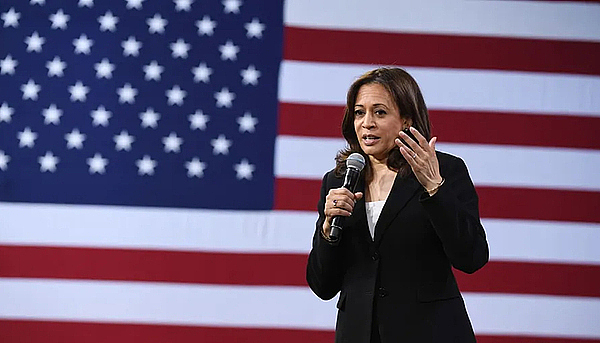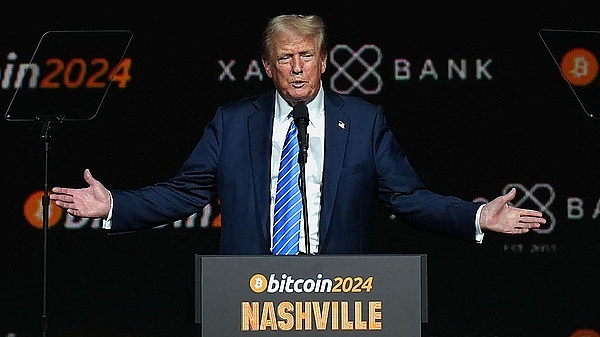Source: ChainMedia
Cryptocurrency Conundrum in the 2024 US Presidential Election
As the global financial landscape continues to evolve, cryptocurrencies, represented by Bitcoin, have become a disruptive force that cannot be ignored. As the 2024 US presidential election approaches, a key question emerges: Will the next leader of the world's largest economy become a beacon for Bitcoin and drive cryptocurrency into a new era of mainstream application?
From Digital Experiment to Global Financial Role
Since its launch in 2009, Bitcoin has transformed from a niche digital experiment to an important part of the global financial market. Today, more and more investors, companies and institutions are beginning to accept cryptocurrencies as legitimate assets. Bitcoin is not only seen as a means of storing value, but also as a safe haven against inflation and monetary policy uncertainty.
However, Bitcoin's rise has not been smooth sailing. Regulatory challenges, volatility issues and environmental impacts continue to keep governments and financial institutions on their guard. Despite this, some US politicians have begun to advocate Bitcoin and blockchain technology in their campaigns to promote innovation in this field.
Positions of Major Presidential Candidates
As the 2024 election approaches, the issue of cryptocurrency is gaining prominence. Let's examine the positions of two key figures:

Kamala Harris: Cautious Regulation, Focus on Innovation
As a Democratic presidential candidate, Kamala Harris has maintained a cautious stance on cryptocurrency. While she has not spoken as frequently on the topic as other politicians, her background as California's Attorney General suggests that she favors consumer protection and regulatory oversight.
Harris has expressed concerns that cryptocurrencies could be used for illegal activities, emphasizing the need for robust anti-money laundering (AML) and know your customer (KYC) protocols. However, she also acknowledged the potential of blockchain technology to promote financial inclusion and innovation.
In a recent statement, Harris said: "We must ensure that while embracing new financial technologies, we do not abandon the consumer protection and financial stability principles that have served our economy so well."

Donald Trump: From Crypto Critic to Potential Supporter?
Former President Donald Trump, a Republican candidate, has always had a complicated relationship with cryptocurrencies. In 2019, Trump tweeted: "I am not a fan of Bitcoin and other cryptocurrencies. They are not money and their value is highly volatile and based on thin air."
However, Trump's position seems to have evolved. In recent interviews, he has shown a more nuanced understanding of the crypto space. While still expressing concerns about a potential threat to the dollar’s dominance, Trump also praised the innovation behind blockchain technology.
“I don’t like the idea of cryptocurrencies replacing the dollar, but I have to admit that the technology is really impressive,” Trump said at a recent rally.
This shift in tone suggests that Trump may be more open to crypto-friendly policies if re-elected, especially if it is seen as a way to maintain the United States’ technological dominance.
Potential Impact of Pro-Bitcoin Policies If the next U.S. president takes a pro-Bitcoin stance, it could have far-reaching effects on the global cryptocurrency market:
1. Regulatory Clarity: A unified regulatory framework could provide much-needed clarity for businesses and investors, potentially spurring growth in the crypto industry.
2. Financial Innovation: Embracing blockchain technology could solidify the United States’ position as a global leader in fintech innovation, and its applications could extend beyond finance to areas such as supply chain management and healthcare.
3. Economic Freedom: Bitcoin’s decentralized nature could provide an alternative financial system that could serve as a potential hedge against future economic crises.
4. Global Leadership: The United States’ support for Bitcoin could influence other countries to follow suit, accelerating global adoption.
Challenges and Considerations
Despite the potential, significant challenges remain. Bitcoin’s volatility continues to worry traditional investors, while its energy consumption has drawn criticism from environmental groups. Any presidential candidate hoping to be a “Bitcoin beacon” must strike a balance between promoting innovation and addressing these issues.
In addition, the decentralized nature of cryptocurrencies poses a challenge to government monetary control. This means that even a president who supports Bitcoin will face resistance from regulators and the traditional financial system.
Conclusion: A Watershed Moment for Cryptocurrencies
The 2024 U.S. presidential election could be a turning point for Bitcoin and the broader cryptocurrency ecosystem. As digital assets continue to gain traction, the stance of the next U.S. president will play a key role in shaping their future.
Whether the next occupant of the White House will be a true Bitcoin beacon remains to be seen. However, one thing is clear: cryptocurrencies have become too important to be ignored. The candidate who can effectively balance regulation and innovation may not only determine the future of digital assets, but also shape the next era of global finance.
As the election approaches, all eyes will be on how the presidential candidates navigate this complex and rapidly evolving space. Decisions made in the coming years could open a new chapter in monetary and financial history.
 JinseFinance
JinseFinance
 JinseFinance
JinseFinance Sanya
Sanya YouQuan
YouQuan JinseFinance
JinseFinance cryptopotato
cryptopotato BNB Chain
BNB Chain Others
Others Numen Cyber Labs
Numen Cyber Labs Cointelegraph
Cointelegraph Cointelegraph
Cointelegraph